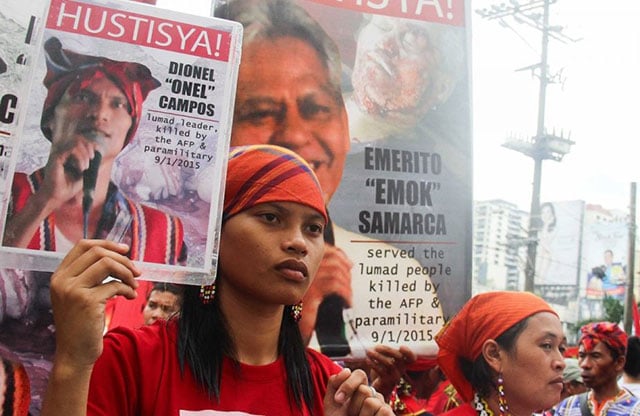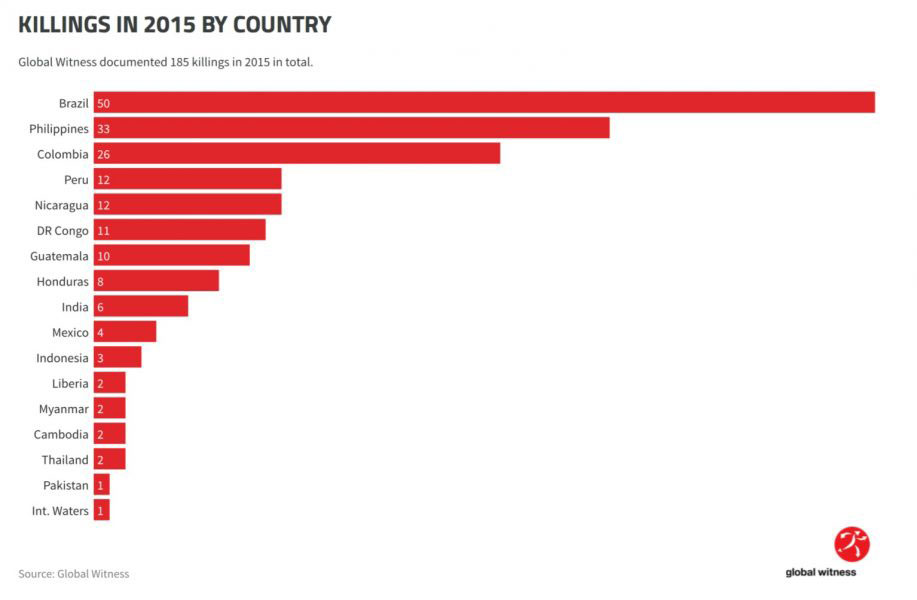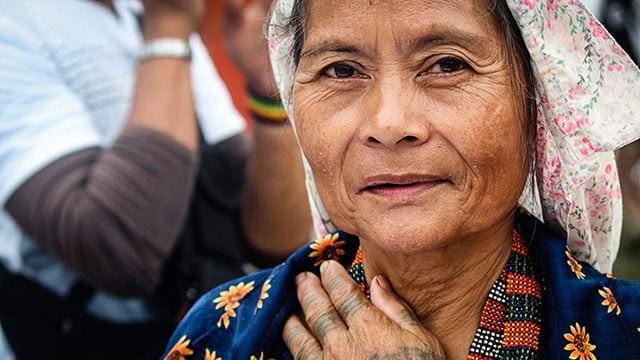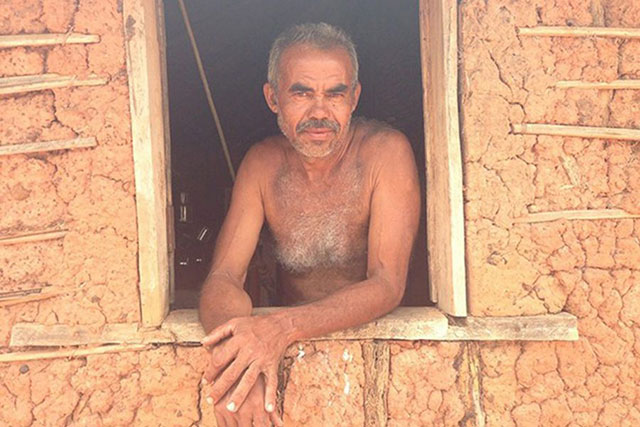
Support justice-driven, accurate and transparent news — make a quick donation to Truthout today!
 Michelle Campos holds a picture of her father, who was killed in September 2015, in the Mindanao region of the Philippines, as were Campos’ grandfather and school teacher. They had all spoken out against mining in the region. (Photo by Tulda Productions, used with permission courtesy of Global Witness.)
Michelle Campos holds a picture of her father, who was killed in September 2015, in the Mindanao region of the Philippines, as were Campos’ grandfather and school teacher. They had all spoken out against mining in the region. (Photo by Tulda Productions, used with permission courtesy of Global Witness.)
It’s a dangerous time to take a stand for the environment. 2015 was the worst year on record for killings of people defending their forests, rivers, and lands from industrial projects, according to a report published on June 20 by Global Witness, a London-based NGO.
The report, On Dangerous Ground, documents 185 cases of environmental activists murdered in 16 countries around the world in 2015. The figure is the highest since Global Witness began collecting data in 2002, and represents a 59 percent increase from 2014.
The failure of governments to investigate and prosecute the killings likely factors into the increase, according to Billy Kyte, a Global Witness campaign leader and report author.
Also see: The Killing Fields: Extrajudicial Killings in the Phillipines.
“The vast majority of these crimes go unpunished which means those responsible know they can get away with it. This, in turn, breeds more violence and we’ve seen attacks become more brazen because of it,” Kyte told Mongabay via email.
The countries with the most killings in 2015 were Brazil with 50 and the Philippines with 33, followed by Colombia (26), Peru (12), and Nicaragua (12). Latin America accounted for more than two-thirds of all cases documented last year.
The total of 185 killings documented by Global Witness is likely an underestimate, according to the organization. Many deaths go unreported, and others could not be adequately verified. Data availability varies widely between countries, and some governments hinder its reporting.
“The lack of monitoring and suppression of the media and civil society in some countries, particularly in Asia and Africa, means, invariably, there are more cases than we have documented,” according to the report.
 Record numbers of environmental activists were killed in 2015 in Brazil, the Philippines and overall. (Image courtesy of Global Witness.)
Record numbers of environmental activists were killed in 2015 in Brazil, the Philippines and overall. (Image courtesy of Global Witness.)
Despite the data constraints, Global Witness was able to categorize many of the cases based on the industries linked to the conflicts amid which environmentalists were killed. The mining and extractive industries sector took the lead, with links to 42 killings in 10 countries. It was followed by palm oil and other agribusiness operations (20 killings), hydroelectric power projects (15), and logging (15).
“We’re seeing industries like mining, hydro dams and agribusiness encroaching more and more into previously untouched areas rich in resources and coming into conflict with local communities who live there, particularly indigenous peoples,” Kyte said.
An estimated five percent of the world’s population is indigenous, but nearly 40 percent of the 185 victims documented by Global Witness in 2015 were indigenous.
 The Mindanao region of the Philippines is home to coal, nickel and gold deposits and international mining companies, including Anglo American and BHP Billiton. Twenty-five environmental activists were killed in Mindanao in 2015. (Photo by Mindanao Interfaith Institute on Lumad Studies (MIILS), used with permission courtesy of Global Witness.)
The Mindanao region of the Philippines is home to coal, nickel and gold deposits and international mining companies, including Anglo American and BHP Billiton. Twenty-five environmental activists were killed in Mindanao in 2015. (Photo by Mindanao Interfaith Institute on Lumad Studies (MIILS), used with permission courtesy of Global Witness.)
The Mindanao region in the southern Philippines is home to the Lumad, the collectively self-ascribed name for the region’s indigenous peoples. Also home to vast mining and agribusiness operations, Mindanao is one of the most dangerous regions in the world for people speaking out or taking action for their lands and resources: 25 were killed in 2015 alone.
“We get threatened, vilified and killed for standing up to the mining companies on our land and the paramilitaries that protect them,” local activist Michelle Campos said in a statement.
On September 1, 2015, Campos’ father, a community leader, was publicly executed in Lianga by a paramilitary group in front of Campos’ younger sisters and other community members. Campos’ grandfather and teacher were also killed. All three were outspoken against mining operations in Lumad lands.
Members of a paramilitary group had previously threatened locals, advising them to abandon the area. In the wake of the attack, an estimated 3,000 indigenous people left their homes, according to Global Witness.
 Killings and threats against indigenous Lumad inhabitants of the Mindanao region of the Philippines continue. (Photo by Mindanao Interfaith Institute on Lumad Studies (MIILS), used with permission courtesy of Global Witness.)
Killings and threats against indigenous Lumad inhabitants of the Mindanao region of the Philippines continue. (Photo by Mindanao Interfaith Institute on Lumad Studies (MIILS), used with permission courtesy of Global Witness.)
“My father, grandfather and school teacher were just three of countless victims,” Campos said. “We know the murderers — they are still walking free in our community. We are dying and our government does nothing to help us.”
The grim news out of Mindanao continues. Several Lumad killings have been reported in 2016, according to Global Witness.
The killing of well-known Honduran indigenous rights activist Berta Cáceres this past March is another bad sign for 2016, according to Kyte. Cáceres was the coordinator of the Civic Council of Popular and Indigenous Organizations of Honduras (COPINH) and won the 2015 Goldman Environmental Prize for her role in the indigenous Lenca struggle to protect a local river from a hydroelectric project.
“The killing of Berta Cáceres this year shows that anyone is now fair game,” Kyte said. “For such a high-profile activist to be gunned down in her home proves that the perpetrators of violence are becoming more audacious and are targeting anyone who gets in their way.”
The report lays out a series of recommendations for companies, investors, international institutions, and especially for national governments.
National governments need to increase protection for land and environmental activists under threat, investigate crimes, and bring perpetrators — including corporate or political masterminds — to justice, said Kyte. Government support for proactive consent and people’s right to say no to projects on their lands are also needed, he said.
 The body of Antônio Izídio Pereira, who worked to protect his village and the forest in the Brazilian Amazon from illegal logging, was found on December 24, 2015. He was one of 50 environmental activists killed in Brazil last year. (Photo by Diogo Cabral/SMDH, used with permission courtesy of Global Witness.)
The body of Antônio Izídio Pereira, who worked to protect his village and the forest in the Brazilian Amazon from illegal logging, was found on December 24, 2015. He was one of 50 environmental activists killed in Brazil last year. (Photo by Diogo Cabral/SMDH, used with permission courtesy of Global Witness.)
“Importantly, [governments] need to resolve the underlying causes of violence against defenders, by formally recognising communities’ rights to their land, and tackling the corruption and illegalities that blight natural resource sectors,” Kyte said.
Inaction will have serious consequences, according to the Global Witness report: “Without these measures those on the frontline in the battle to save the environment will continue to be killed in record numbers — and any hope we have for future generations will also be killed.”
Media that fights fascism
Truthout is funded almost entirely by readers — that’s why we can speak truth to power and cut against the mainstream narrative. But independent journalists at Truthout face mounting political repression under Trump.
We rely on your support to survive McCarthyist censorship. Please make a tax-deductible one-time or monthly donation.